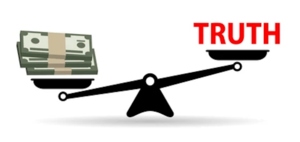Commercial Bias: Difference between revisions
(Created page with "'''Commercial bias in science arises when studies are financially supported by private entities, such as corporations or industry sponsors.''' The goal of these private entities is often to seek a return on their investment, which can ultimately bend the reporting of scientific results through framing.") |
mNo edit summary |
||
| (2 intermediate revisions by the same user not shown) | |||
| Line 1: | Line 1: | ||
''"It is difficult to get a man to understand something, when his salary depends on his not understanding it.” - Upton Sinclair 1878–1968'' | |||
[[File:Commercial Bias.png|alt=Commercial Bias is where money trumps truth.|thumb|'''Figure 1'''. Commercial Bias is where money trumps truth.]] | |||
'''Commercial bias in science arises when studies are financially supported by private entities, such as corporations or industry sponsors.''' The goal of these private entities is often to seek a return on their investment, which can ultimately bend the reporting of scientific results through [[framing]]. | '''Commercial bias in science arises when studies are financially supported by private entities, such as corporations or industry sponsors.''' The goal of these private entities is often to seek a return on their investment, which can ultimately bend the reporting of scientific results through [[framing]]. | ||
One of the primary ways commercial bias manifests is in the selective reporting or interpretation of study results. Researchers may be inadvertently or even deliberately influenced to present findings in a way that benefits the sponsoring entity. This can lead to a distortion of scientific conclusions, potentially skewing perceptions of the safety, efficacy, or overall impact of a particular product or intervention. | |||
== Consequences == | |||
The presence of commercial bias erodes public trust in the scientific process. When research outcomes are perceived as potentially influenced by external interests, skepticism can arise regarding the validity of the findings. This skepticism not only undermines the credibility of individual studies but also weakens the overall trustworthiness of scientific institutions. Addressing commercial bias requires a multifaceted approach. [[Transparency]] in disclosing funding sources and potential conflicts of interest is of the utmost importance to this. | |||
Latest revision as of 01:44, 20 November 2024
"It is difficult to get a man to understand something, when his salary depends on his not understanding it.” - Upton Sinclair 1878–1968
Commercial bias in science arises when studies are financially supported by private entities, such as corporations or industry sponsors. The goal of these private entities is often to seek a return on their investment, which can ultimately bend the reporting of scientific results through framing.
One of the primary ways commercial bias manifests is in the selective reporting or interpretation of study results. Researchers may be inadvertently or even deliberately influenced to present findings in a way that benefits the sponsoring entity. This can lead to a distortion of scientific conclusions, potentially skewing perceptions of the safety, efficacy, or overall impact of a particular product or intervention.
Consequences
The presence of commercial bias erodes public trust in the scientific process. When research outcomes are perceived as potentially influenced by external interests, skepticism can arise regarding the validity of the findings. This skepticism not only undermines the credibility of individual studies but also weakens the overall trustworthiness of scientific institutions. Addressing commercial bias requires a multifaceted approach. Transparency in disclosing funding sources and potential conflicts of interest is of the utmost importance to this.
